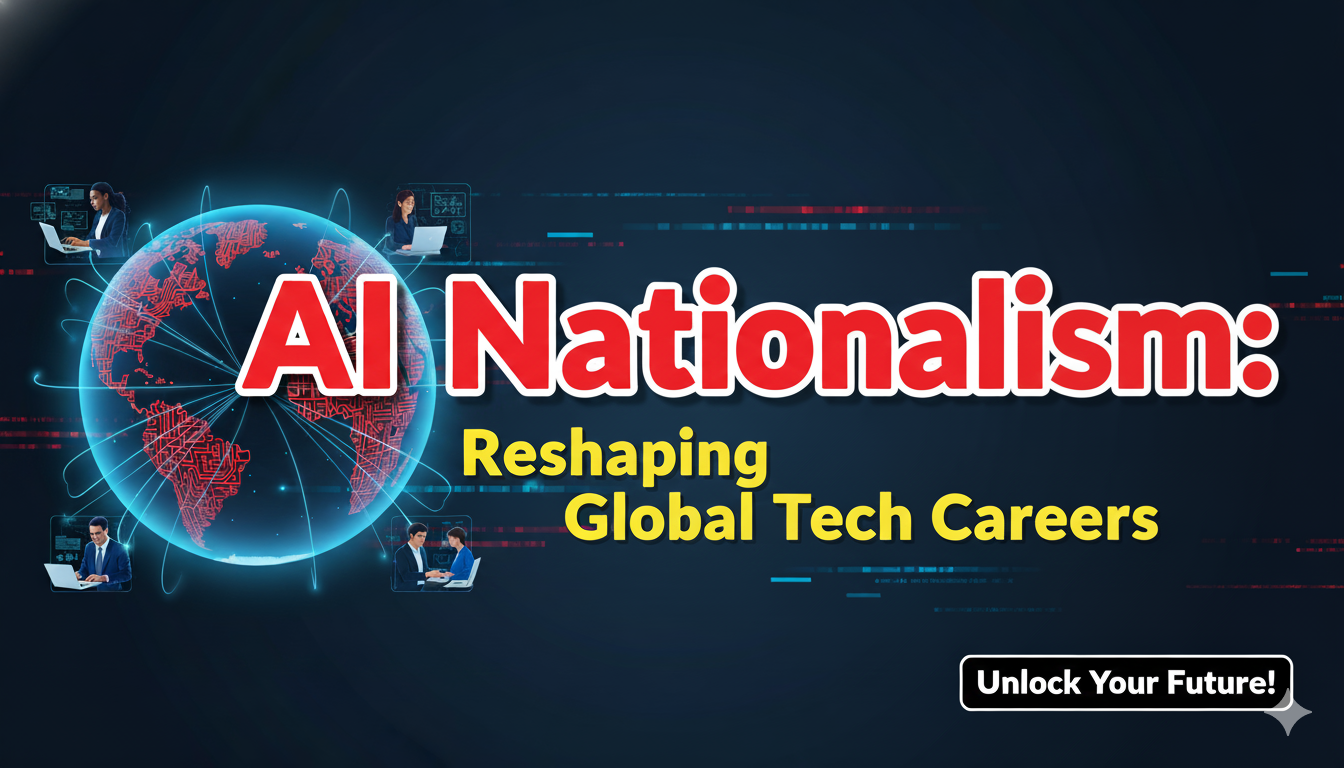Introduction: The New Global Race
In 2016, the world watched as AlphaGo, an AI developed by Google’s DeepMind, defeated a champion at Go, a complex Chinese board game. The event was watched by over 280 million people in China and served as a powerful symbolic moment, catalyzing the nation to publish its own national AI strategy just months later . This event underscores a pivotal shift in global politics: artificial intelligence is no longer just a technological frontier but a matter of national priority.
This new era is defined by AI Nationalism—the idea that nations must develop and control their own AI technologies to protect their national interests, ensure technological sovereignty, and secure economic and military advantages . But what does this high-stakes geopolitical race mean for the millions of tech professionals around the world? As countries pour billions into domestic AI capabilities, the landscape of tech careers is being fundamentally reshaped, creating both unprecedented opportunities and new challenges for those in the field.
What Is AI Nationalism?
Coined by British technology investor Ian Hogarth in 2018, the term “AI Nationalism” describes a government-driven approach to bolster domestic AI industries as the technology’s economic and military significance expands . This mindset frames AI development as a zero-sum game, where the winner gains substantial global influence.
At its core, AI nationalism is fueled by several key beliefs:
- Economic Dominance: Leadership in AI is expected to translate into trillions of dollars in economic productivity and growth .
- National Security: AI is viewed as crucial for future warfare, cybersecurity, and intelligence, making technological dependence a national vulnerability .
- Geopolitical Power: The race is often compared to the 20th-century space race, with nations competing to set global standards and ethical frameworks that favor their own technologies and values .
This trend is not merely theoretical. It is reflected in tangible government policies: restrictions on the sale of high-speed chips, data localization laws, export controls, and significant state investments in domestic research and startups .
The Global Landscape of AI Nationalism
Nations are deploying diverse strategies to secure their positions in the global AI hierarchy, creating a complex and competitive international landscape.
The United States: A Powerhouse Driven by Private Investment
The U.S. maintains a strong lead, characterized by massive private investment and a focus on maintaining its technological edge.
- Investment Scale: From 2013 to 2024, private AI investment in the U.S. reached a staggering $470.9 billion .
- Strategic Moves: Policies like the CHIPS and Science Act aim to bolster domestic semiconductor production, a critical component for AI. The U.S. also maintains export restrictions on advanced chips to slow the progress of geopolitical rivals .
- Infrastructure Leadership: The U.S. leads in AI compute power with 39.7 million H100 equivalents, fueling its ecosystem of tech giants and innovative startups .
China: State-Led Ambition to Lead by 2030
China’s approach is highly centralized and ambitious, driven by its “New Generation Artificial Intelligence Development Plan.”
- Strategic Goal: Become the world’s leading AI innovation hub by 2030 .
- Government Backing: A state-supported fund worth 60 billion yuan (about $8.2 billion) was announced in 2025 to finance early-stage AI ventures .
- Patent Dominance: From 2014 to 2023, Chinese inventors produced 38,210 generative AI-related inventions—six times the total produced by U.S. inventors .
The European Union: Championing Regulation and Ethical AI
The EU is positioning itself as a global leader in the responsible deployment of AI, balancing investment with robust regulation.
- Major Investment: The EU launched InvestAI, a plan to mobilize €200 billion in AI investment, including a €20 billion fund for AI “gigafactories” .
- Regulatory Power: The EU’s AI Act and a push for “digital sovereignty” reflect a strategy to promote European values and security, creating a distinct regulatory environment for tech professionals to navigate .
Other Key Players
- United Kingdom: Positioning itself as the world’s third-largest AI market, the UK is heavily investing in AI for banking and financial services (BFSI) and has established an AI Safety Institute .
- Canada: With a $2 billion sovereign AI compute strategy, Canada is focused on building domestic computational capacity and leveraging its strengths in energy and climate .
- UAE and Saudi Arabia: These nations are investing heavily to diversify their economies beyond oil, with the UAE targeting 14% of its GDP from AI by 2030 .
What AI Nationalism Means for Tech Careers
The rise of AI nationalism has a direct and profound impact on the global tech job market, influencing where opportunities are located, what skills are in demand, and how professionals must navigate their career paths.
Surging Demand for Specialized AI Roles
The intense focus on AI development is creating a boom in demand for specialized talent. Companies and governments are prioritizing hiring for roles that drive AI innovation and implementation.
The following table outlines some of the most in-demand AI jobs and their typical salary ranges:
| Job Title | Description | Typical Salary Range (USD) |
|---|---|---|
| AI Product Manager | Leads development of AI products, requiring both technical and team leadership skills . | $113,000 – $140,000 |
| AI Research Scientist | Develops new AI algorithms and models; typically requires advanced degrees . | $136,000 – $225,000 |
| AI Ethics Specialist | Develops ethical guidelines and policies for AI projects, ensuring responsible deployment . | $120,000 – $180,000 |
| Computer Vision Engineer | Specializes in programs that use visual input, like facial recognition or autonomous vehicles . | $125,000 – $226,000 |
| Machine Learning Engineer | Designs and builds AI systems that can learn and apply knowledge . | Often included in “AI Engineer” roles, with high demand in top tech hubs . |
| Cybersecurity Analyst (AI) | Uses AI to combat threats and protect against AI-powered cyberattacks . | $120,000 – $200,000 |
Geographic Shifts in Opportunity
AI nationalism is redirecting the global flow of tech talent and opportunity.
- The Rise of New Tech Hubs: While the U.S. (particularly Silicon Valley, Seattle, and New York) remains a dominant force, other hubs are gaining prominence due to national strategies. Cities like Montreal and Toronto in Canada, London in the UK, and Beijing and Shenzhen in China are becoming major destinations for AI talent, supported by government investment and growing tech ecosystems .
- Visa Policies Attracting Talent: Many countries have created streamlined visa programs to attract the AI talent they need. The UK’s Global Talent Visa, Canada’s Global Talent Stream, and China’s R visa for high-level professionals are examples of policies designed to make it easier for skilled AI specialists to work and live in these countries .
The Double-Edged Sword of Protectionism
While creating opportunities, AI nationalism also presents challenges through protectionist policies.
- Potential for Market Distortion: Export controls, data localization, and restrictions on foreign acquisitions can create siloed markets and potentially stifle global collaboration and innovation .
- Impact on Global Mobility: Professionals may find that working on certain international projects or for companies based in rival nations becomes more complex due to these geopolitical tensions.
Actionable Insights for Tech Professionals
To thrive in this new environment, tech professionals must be strategic, adaptable, and proactive.
1. Prioritize Continuous and Interdisciplinary Learning
The demand is shifting from generalists to specialists with deep knowledge . However, the most valuable professionals will also be those who can bridge disciplines.
- Technical Upskilling: Deepen expertise in high-demand areas like machine learning, natural language processing, and computer vision. Proficiency in Python remains a highly sought-after core skill .
- Learn the Language of Ethics and Policy: As nations emphasize “ethical AI,” understanding frameworks for fairness, accountability, and transparency becomes a competitive advantage. Consider certifications in AI ethics or responsible AI .
- Develop Business Acumen: Tech professionals who understand how AI aligns with national and corporate strategic goals will be better positioned to lead.
2. Strategize Your Geographic Career Path
Your location will significantly influence your opportunities.
- Research Growing Hubs: Look beyond traditional tech centers. Countries like Canada, Germany, and Singapore offer competitive salaries, high quality of life, and immigration-friendly policies for AI talent .
- Understand Local Regulations: If you work in data science or AI ethics, familiarize yourself with the regulatory environment of your target country, such as the EU’s AI Act or China’s data laws, as these will directly impact your work .
3. Cultivate Skills That AI Cannot Easily Replace
As AI automates routine tasks, human-centric skills will become more valuable.
- Focus on Collaboration and Communication: The ability to work effectively in teams and explain complex AI concepts to non-technical stakeholders is crucial .
- Embrace Human-Centric Roles: Professions that require high levels of human interaction, personal touch, and nuanced decision-making—such as AI product management, UX design for AI systems, and AI ethics oversight—are less susceptible to automation and are increasingly critical .
4. Embrace AI Collaboration
Resisting AI is not a viable career strategy. Instead, focus on becoming a professional who effectively collaborates with AI tools.
- Become AI-Powered: Use AI to augment your capabilities. Data analysts can use AI for deeper insights, designers can use generative tools for prototyping, and developers can use AI for code assistance. The goal is to leverage AI to focus on more complex, creative, and strategic aspects of your work .
Conclusion: Navigating a Nationalistic AI Future
AI nationalism is reshaping the world, defining a new era of geopolitical competition centered on technological supremacy. For tech professionals, this trend is not an abstract concept but a concrete force that is creating new career hotspots, driving demand for specialized and ethical skills, and redrawing the global map of opportunity.
The path forward requires a commitment to lifelong learning, geographic and strategic awareness, and a focus on the uniquely human skills that will define the next generation of technology. The race for AI supremacy is underway, and for those prepared to adapt, it is filled with opportunity.
Sources and References
- Wikipedia: AI Nationalism – Definition and global trends of AI nationalism.
- Forbes: 11 Jobs AI Could Replace In 2025—And 15+ That Are Safe – Impact of AI on jobs and safe career paths.
- LinkedIn: The New AI Nationalism – Analysis of the emerging trend and global governance.
- TealHQ: How to Become a AI Ethics Specialist in 2025 – Career path for AI ethics professionals.
- LinkedIn: AI Nationalism: A Geopolitical Race for Technological Supremacy – Examples and consequences of AI nationalism.
- TechTarget: 10 top AI jobs in 2025 – List of in-demand AI roles and salaries.
- GM Insights: The Global AI Race: How Countries Are Competing in 2025 – Country-level investments, strategies, and statistics.
- Day of Dubai: 2025 Outlook: AI Threats, Supply Chain Nationalism, and Centralized Risks – Cybersecurity and supply chain impacts.
- Medium: AI Nationalism – Early conceptualization of the term.
- DigitalDefynd: Top 25 Countries to Build a Career in AI [2025] – Global comparison of AI career opportunities and salaries.


















